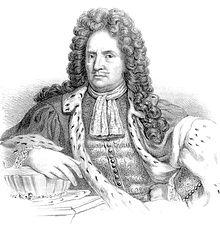Erik Dahlbergh
|
Count Erik Dahlbergh |
|
|---|---|
 |
|
| Birth name | Erik Jönsson |
| Born |
10 October 1625 , Sweden |
| Died | 16 January 1703 (aged 77) Stockholm, Sweden |
| Allegiance | Sweden |
| Years of service | 1647–1702 |
| Rank | Field marshal |
| Battles/wars |
Northern Wars Scanian War Great Northern War |
| Other work | Suecia Antiqua et Hodierna |
| Signature | |
Count Erik Jönsson Dahlbergh (10 October 1625 – 16 January 1703) was a Swedish engineer, soldier, and field marshal. He was born of peasant stock but he eventually rose to the level of nobility through his military competence. He was renowned for fortification works and was called the "Vauban of Sweden".
Erik Dahlbergh was born of peasant stock in , Sweden, but rose to the level of titled nobility due to his military abilities. His early studies involved the science of fortification. Orphaned at an early age, Dahlbergh's studies qualified him as a scribe and in 1641 he found employment with Gert Rehnskiöld, the senior accountant for Pommern and Mecklenburg. During his six years he was taught the fundamentals in draughtsmanship and stood out for his ability to draw. While learning these skills, he also intensely studied mathematics, architecture, perspective and map drawing.
As an engineer officer he saw service in the latter years of the Thirty Years' War. In 1650, the military command dispatched Dahlbergh to Frankfurt to recoup war indemnity awarded to Sweden following the end of the war and the Treaty of Westphalia. Dahlbergh contacted the publishing firm of Merian and provided topographical maps. In 1635 Matthäus Merian the Elder initiated the Theatrum Europaeum, a series of contemporary chronicles published until 1732. Both works, the Theatrum Europaeum and the topographical prints, were continued following the death of Mattheus Merian in 1650 by his sons and stepsons.
He attempted several unsuccessful pilgrimages to Palestine and Jerusalem both by sea and land. While studying art in Italy, news reached him of a coming war between Sweden and Poland-Lithuania and he saw the potential for a military career and he rode from Rome to Stettin in 23 days.
In his military career, Dahlbergh saw service in Poland where he probably witnessed the fighting at the second battle of Warsaw and survived a plague which nearly killed him. As adjutant-general and engineering adviser to Charles X of Sweden, he had a great share in the famous crossing of the frozen Belts, and at the sieges of Copenhagen and Kronborg where he directed the engineers during the Northern Wars. In spite of his distinguished service, however, Dahlbergh remained an obscure lieutenant-colonel for many years. His patriotism, however, proved superior to the tempting offers Charles II of England made to induce him to enter the British service, when, in that age of professional soldiering, the offer was completely acceptable.
...
Wikipedia
